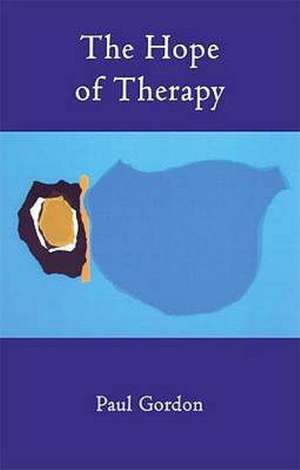The Hope of Therapy
Autor Paul Gordonen Limba Engleză Paperback – 18 dec 2008
Preț: 108.08 lei
Nou
Puncte Express: 162
Preț estimativ în valută:
20.68€ • 21.59$ • 17.12£
20.68€ • 21.59$ • 17.12£
Carte indisponibilă temporar
Doresc să fiu notificat când acest titlu va fi disponibil:
Se trimite...
Preluare comenzi: 021 569.72.76
Specificații
ISBN-13: 9781906254117
ISBN-10: 1906254117
Pagini: 129
Dimensiuni: 138 x 216 x 10 mm
Greutate: 0.19 kg
Ediția:New ed
Editura: PCCS Books
Locul publicării:United Kingdom
ISBN-10: 1906254117
Pagini: 129
Dimensiuni: 138 x 216 x 10 mm
Greutate: 0.19 kg
Ediția:New ed
Editura: PCCS Books
Locul publicării:United Kingdom
Notă biografică
Paul Gordon has been owrking as a psychotherapist in different settings for almost 20 years, is a member of the Philadelphia Association and works in private practice and as a therapist to one of the Philadelphia Association community households. He lives in London, UK, with his wife and two children. He is the author of Face to Face: Therapy as ethics (1999) and co-editor of Between Psychotherapy and Philosophy: Essays from the Philadelphia Association (2004).
Cuprins
Contents 1. The ethical space of therapy 2. The limitless conversation 3. The space of therapy 4. An aesthetics for therapy 5. The poetics of therapy 6. The hope of therapy
Recenzii
To heal somebody you need first to be an expert in recognising the wounds. paul Gordon knows about the 100 despairs hidden behind the term flexibility, the emotional mutilations inflicted by the present global economy. In this green oasis of a book there's a well of compassion. It will help you to help - John Berger, novelist, critic and essayist. This is a small book with a powerful message. The author's thesis is that therapy is not a scientific or technical process but 'rather an art of craft requiring a particular sensiblilty or dispostition' which he sees as an ethical endeavour. He presents his well-reasoned rationale thoughtfully, humanely and with passion - his desire is to eradicate smugness and quick cures, and to make inflexible frameworks more flexible. Jenny Bloomer, Counsellor/Psychotherapist, Therapy Today July 2009
